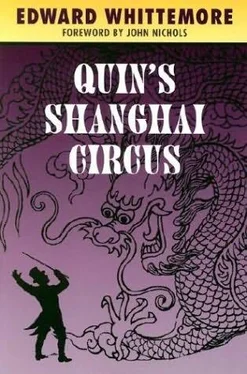Edward Whittemore - Quin’s Shanghai Circus
Здесь есть возможность читать онлайн «Edward Whittemore - Quin’s Shanghai Circus» весь текст электронной книги совершенно бесплатно (целиком полную версию без сокращений). В некоторых случаях можно слушать аудио, скачать через торрент в формате fb2 и присутствует краткое содержание. Жанр: Фэнтези, на английском языке. Описание произведения, (предисловие) а так же отзывы посетителей доступны на портале библиотеки ЛибКат.
- Название:Quin’s Shanghai Circus
- Автор:
- Жанр:
- Год:неизвестен
- ISBN:нет данных
- Рейтинг книги:3 / 5. Голосов: 1
-
Избранное:Добавить в избранное
- Отзывы:
-
Ваша оценка:
- 60
- 1
- 2
- 3
- 4
- 5
Quin’s Shanghai Circus: краткое содержание, описание и аннотация
Предлагаем к чтению аннотацию, описание, краткое содержание или предисловие (зависит от того, что написал сам автор книги «Quin’s Shanghai Circus»). Если вы не нашли необходимую информацию о книге — напишите в комментариях, мы постараемся отыскать её.
Quin’s Shanghai Circus — читать онлайн бесплатно полную книгу (весь текст) целиком
Ниже представлен текст книги, разбитый по страницам. Система сохранения места последней прочитанной страницы, позволяет с удобством читать онлайн бесплатно книгу «Quin’s Shanghai Circus», без необходимости каждый раз заново искать на чём Вы остановились. Поставьте закладку, и сможете в любой момент перейти на страницу, на которой закончили чтение.
Интервал:
Закладка:
In addition to crossing the gangplank he had only one other task, to accompany his employer periodically to the secret meetings he held with bereaved grandmothers. On these occasions he guarded the door while his employer and the grandmother discussed the details of a funeral.
Kikuchi-Lotmann’s syndicate was the largest criminal organization in greater east Asia. In terms of gross criminal profits it was the third largest in the world. Yet despite his responsibilities he indulged himself in a very curious sideline known as the funeral racket, whereby he would provide a long procession of black limousines and thousands of mourners dressed in black for a man who died unloved and unmissed.
The funeral procession might contain two limousines or many hundreds of limousines, depending on the amount of money paid. In the last limousine would be found the legitimate family, invariably small, presided over by a weeping, triumphant grandmother. The other family members would be unaware of the funeral’s fakery. Only the matriarch knew how large a part of her husband’s fortune she had used for this immensely expensive deception.
As they drove through the crowds of mourners the grandmother pointed them out and pointed to the line of limousines ahead of them.
Never forget, she said, the day your grandfather was cremated. Remember how he was loved and revered despite the money he made. Remember the thousands who came to do him homage.
Her children nodded, her grandchildren nodded, the mourners returned to Kikuchi-Lotmann’s henchmen to collect their wages.
Hato admired the cleverness of the racket. A whore had to spend at least a few minutes with a customer, everyone couldn’t take drugs all the time. But the funeral market had no limit, the number of ancestors to be revered was infinite. Hato intended to expose the operation in his first gangster movie. People would come from many countries to interview him. He would be asked to lecture and give his opinions on television.
Paris. Eight years away.
Hato stood in line thinking of the calisthenics he would have to do the next morning at six o’clock. At seven he would march around the courtyard singing a haiku. That night or the next night a young girl disguised in rags would break into his room and call him a mother-fucker.
Hato grinned. There could be more to gangsterism than gangplanks and funerals. When the movie was over he would go talk to Kikuchi-Lotmann’s other bodyguard, the one who was called the policeman.
He was a small man, as small as Mama, born to her parents the year they sold her to the brothel in Kobe, the year before the First World War broke out in Europe. His father beat him as regularly as he beat his wife until he was eaten by a dog one winter night.
The father had collapsed in a snow drift on the way home from a drinking bout. A dog found him and sniffed his hot breath. Like every other creature in the Tohoku that winter, the dog was starving. Soon he was not only sniffing the hot breath but chewing it, chewing the lips and tongue that went with it.
All the peasants in the neighborhood had been ordered to line the road the next day at first light, to show their respect for their landowner who was expected to drive past sometime during the morning. The policeman’s father was found with a large part of his face gone. He was carried home and treated, but his wife and son were told to wait beside the road until the aristocrat drove by. Thereafter the policeman’s father wore a cotton surgical mask and stopped beating his family.
The dreaded Tohoku district was forever given to gray skies and winds and blizzards from Siberia. Half of the family’s crop of mulberry leaves had to be turned over as payment for use of the land. With the other half they paid their taxes and tried to subsist.
Their plot of mulberry trees was an hour’s walk from the hut where they lived. Centuries ago the hills had been terraced, which gave the Tohoku the look of a land of giants. But for a peasant family such as the policeman’s the giant steps went nowhere.
When he was eight years old the silk market in America collapsed once again. As before, his father blamed the catastrophe on his wife because she was an Ainu and had Caucasian blood. Unable to bear the hatred in his eyes any longer, she finally broke the ice in a rice paddy and drowned herself in three inches of water.
The policeman’s father died of stomach cancer, arthritis, and advanced tuberculosis in 1931, the year the Japanese seized Manchuria after one of their railroads was blown up there, apparently by Chinese patriots. In retaliation the international city of Shanghai boycotted all goods of Japanese manufacture, an act that many Japanese army officers found outrageously insolent. That same year the policeman enlisted in the army to escape the misery of the Tohoku.
From the very beginning he liked his new life. The routine was easy enough, he worked hard and did what he was told. At the end of training he was rewarded with an assignment to a Kempeitai unit in Korea.
The country was as poor as the Tohoku, but now the Koreans were the tenant farmers and he was one of the landlords and tax-collectors. The main work of his unit was the interrogation of peasants suspected of withholding rice. While trying to break the peasants, beating them when necessary, he experienced a sense of accomplishment that was new to him. For the first time in his life he learned to smile.
An inexplicable event occurred soon after he was promoted to corporal. He and some other corporals got drunk one night and the talk turned to women. There were no whores in the village where they had arrived that day, but the policeman boasted he could find one anyway. He went away laughing, leaving his friends laughing behind him.
The next day an officer called them in. A village elder had been clubbed while protecting his daughter. It was not the way for a member of the Imperial Army to act with monkeys of an inferior race. The guilty one was ordered to admit his breach of discipline.
The policeman stood stonily at attention, expecting the other corporals to do the same. But to his astonishment he saw them stepping forward one by one to denounce him.
It was spring. Tiny green shoots were just reaching above the water in the rice paddies. The three months of latrine duty meant nothing to him but the betrayal by his fellow corporals, the men he had thought were his comrades, influenced him so profoundly he was never able to trust anyone again, even to the point where the only sexual act of which he was capable thereafter was one involving a dead person, performed with an instrument so that his own body would have no contact with the corpse.
From Korea he was transferred to Manchuria, to the unit of a captain in Mukden who always wore civilian clothes. Although the Captain could read, he was also a peasant from the Tohoku and didn’t despise the policeman just because he was illiterate. It was from the Captain he learned that the bombing of the railroad in Manchuria the year before, the incident that led to the Japanese seizure of Manchuria, had not been the work of Chinese patriots but of the Kempeitai itself.
The Captain was the protege of a Kempeitai general then stationed in Tokyo. To provide the General with information he wanted on various factions in the army, thereby increasing the General’s maneuvering power over his fellow officers, the policeman was asked to steal documents from certain units near Mukden. The policeman was so successful in his assignments the Captain took him with him when he flew to Shanghai on a secret mission in January 1932.
For a week the policeman was locked in an apartment memorizing various Chinese patriotic slogans. The Captain came and went and at the end of the week gave him his instructions.
Читать дальшеИнтервал:
Закладка:
Похожие книги на «Quin’s Shanghai Circus»
Представляем Вашему вниманию похожие книги на «Quin’s Shanghai Circus» списком для выбора. Мы отобрали схожую по названию и смыслу литературу в надежде предоставить читателям больше вариантов отыскать новые, интересные, ещё непрочитанные произведения.
Обсуждение, отзывы о книге «Quin’s Shanghai Circus» и просто собственные мнения читателей. Оставьте ваши комментарии, напишите, что Вы думаете о произведении, его смысле или главных героях. Укажите что конкретно понравилось, а что нет, и почему Вы так считаете.












